
There are five breeds of dogs that are counted among the lion dogs:
- Chow-Chow
- Lhasa Apso
- Shih Tzu
- Pekinese
- Rhodesian Ridgeback
If you look at these five breeds, you will notice that the name “lion dog” sounds very dangerous and majestic, but there are no huge “monster dogs” hidden behind it. But what then is hidden behind this term? Or, in other words, how does the lion dog define itself?
First of all, we should clarify that the term “lion dog” does not come from the ranks of the FCI. There are exactly 2 reasons to give this designation to a dog breed.
- If the dog has a fur collar that resembles a lion’s mane, it can be given the designation “Lion Dog”. However, it should also be revealed right away that often it is helped. In the worst case, it is the dog groomer who provides the appropriate hair splendor.
- The second category of dog that qualifies for this name actually still has the courage of the lion tamer, the courage and confidence to take on even big game. They are still in use today as hunting dogs in Africa. Accordingly, they are dogs that have a certain size, demeanor and dominance.
What can be said about the temperament and character of a lion dog?
It is true that the name “lion dog” has been used with different orientation in the past years, so it is difficult to say exactly how to define the lion dog. Three character similarities, however, can be found between all lion dogs.
- They are loners: the nature of the Lionhound is independent. Certainly they are devoted to their owner. But they are equally capable of getting along on their own.
- They possess a “lion’s heart”. You don’t necessarily see it on the breeds. And yet they possess a true lion’s heart. They act boldly, quickly and courageously. They are foolhardy and self-confident. Sometimes they don’t even know it yet. A concrete situation must first occur for them to reveal their lion’s heart.
- Attention, attention – distrust alarm: Do you know these dogs, who are distrustful of everyone at first or always have the right nose, when it makes sense to be distrustful? The lion dogs are true detectors, which are actually always somehow right with their assessment of the people standing in front of them. Even at the slightest sign of danger or even possible danger, in fact, even when someone unknown approaches, you will be able to hear this by his loud barking. He simply announces everyone.
So let’s just take a closer look at the individual lion dog breeds.
The Chow-Chow
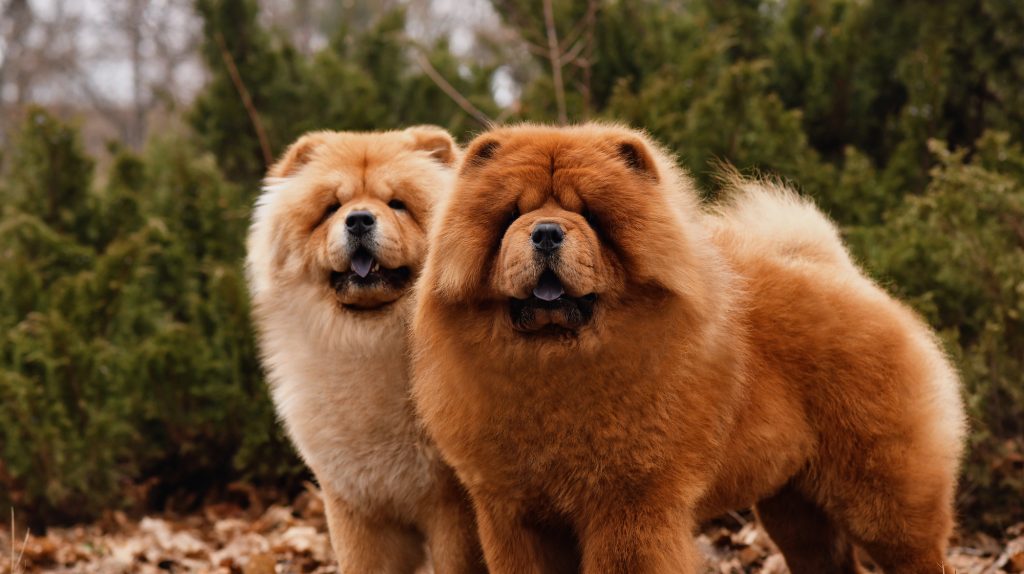
Sometimes you can find him under the name “Chinese Lion Dog”. Yes, one could say that the Chow-Chow resembles a lion, as he stands in front of you with his thick mane. Many times you also hear that comparisons are made with bears. No matter what you see in this dog, it belongs to the oldest dog breeds in the world. Not only the exterior is quite extraordinary. Also, various characteristics that the Chow-Chow brings with it, according to not “the norm”.
The FCI has classified him in the group 5, Spitz and the primitive dogs, section 5, Asisatic Spitz and related dog breeds. It is commonly called a guard dog.
If asked about its appearance, most will probably answer that it has a purple tongue. The males reach a height at the withers of 56 centimeters. The females are slightly smaller. At the same time, they have a weight of 20 to 30 kilograms.
Usually we know the Chow-Chow with long coat. However, it can also be short, depending on the breeding line. If we are dealing with a specimen with a long coat, the outer coat is rough, the undercoat is woolly, soft and provides good “air conditioning” for the animal. However, if the coat is short, the coat will be decidedly thick and smooth. The topcoat may stand out slightly, with a fluffy feel. In both varieties, we find the dense hangings on the neck, creating the “lion’s mane”.
As compact as the Chow-Chow appears at first glance, his overall appearance is proud and dignified. His dark eyes emphasize the majesty even more. The eyes can be black as well as dark blue. Here it is important that the eye color harmonizes with the coat color.
Certainly the Chow-Chow is affectionate. Certainly he knows exactly who belongs to “his” family. Nevertheless, he is distant. Excellent he can show you the cold shoulder. Playfully there is not much to do with him. Playing children, however, he lets without problems. Calm and peaceful, he will keep an eye on his territory, but will not actively seek the attention of his owners. He is the perfect companion and watchdog. Not pushy, but still always present and on the spot when needed.
He likes to look for a lonely place in the house or garden, where he is best not disturbed. But he still does watch out. By the way, he prefers to communicate with glances. This is one of the reasons why he was used as a hunting or guard dog in the past. Today he is mainly seen as a companion or show dog. And this, although his innate potential is still very much present and could be used.
In addition, the Chow-Chow is very intelligent. If one used him for this reason in former times as a war dog, this ability shows up today more in the fact that he can listen and execute. This is a real blessing for working with him. His hunting instinct is present, but would have to be reactivated if one wanted to use him for hunting. His ambition to pursue potential prey is virtually nil.
“His pack” means everything to him, so any expressions of affection will never apply to strangers. It is also not advisable to stroke his head if you are a stranger to him. He will be gruff.
The Chow-Chow is a stubborn dog, which likes to resist a command. In order to counteract this, it is necessary to start with a loving and strict education already in the puppy age. No, violence has lost nothing here either. But a lot of consistency, gentleness, patience and sometimes ingenuity are required to achieve and furthermore maintain not only the education and socialization of the animal, but also the good relationship with its owner. Mutual trust and respect are the only basis on which this can be initiated.
As an independent spirit, if the enclosure of the garden, the yard is inadequate, it may well happen that the Chow-Chow sets out to scout the surroundings. This must be counteracted.
The Lhasa Apso
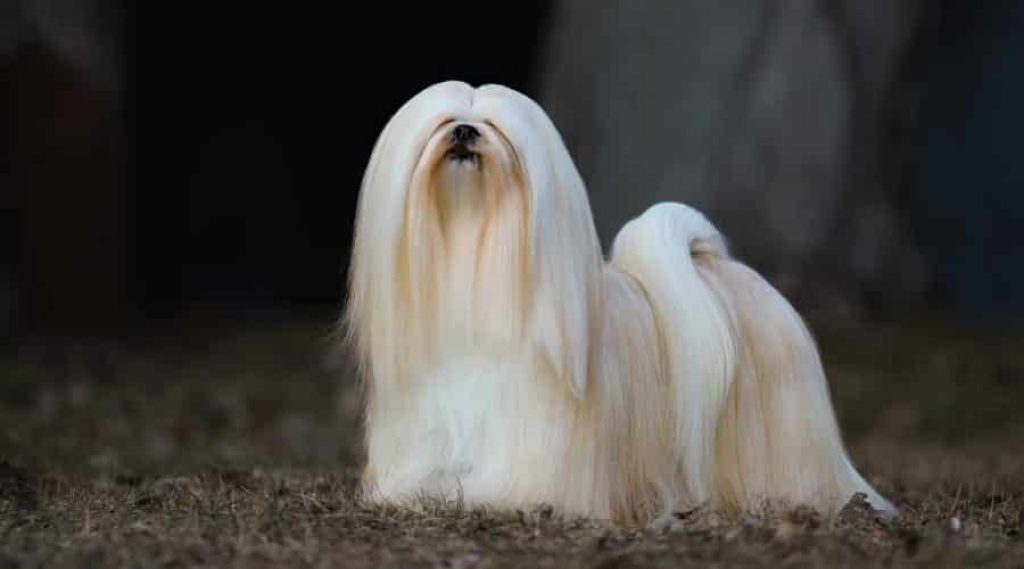
Yes, that’s right – this is a small social and companion dog. He only grows to a maximum height of 30 centimeters and has a corresponding weight. His origin is as a guard dog in Tibetan monasteries and courts. Today, the times of guarding are actually over, as he enjoys worldwide enthusiasm among dog owners who have turned to the small dog breeds.
No wonder, because he is a perfect beginner dog that can easily get along in apartments and in the city. Thus, he can find a home in virtually any household. Whether young or old, this dog adapts perfectly to any owner. But beware – he loves to play for his life.
The life expectancy of the Lhasa Apso is fourteen to eighteen years. He has a long, soft top coat and a medium undercoat that protects him from the elements. The outer coat is heavy and rough. It requires a medium amount of grooming. The appearance is proud and compact.
Because of its affection and attention, the Lhasa Apso is the perfect companion for children of all ages, as well as seniors. Cheerful as he is, he is a sunny companion for everyone. He is an intelligent dog who loves to learn new things. Thus, he can be registered for various dog sports. His hunting instinct is only slightly pronounced.
Towards strangers he can be very shy, so it takes a while until he builds up an intimate relationship with his owner. But once this is established, nothing can come between him and his owner.
The Lhasa Apso is independent in origin. So it is possible to leave him alone once in a while. But he will also just retreat once in a while to have his peace. This should not be taken personally.
The Pekinese
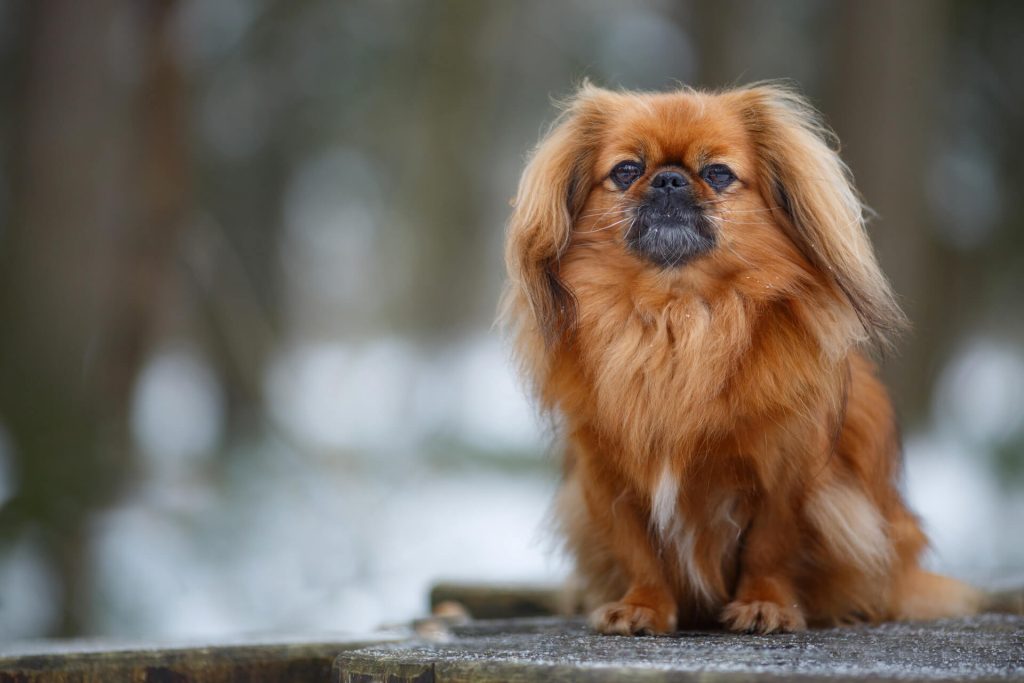
It is also called the “Chinese Palace Dog”. This is because even the earlier rulers kept this dog as a companion and social dog. But beware: if this dog does not enjoy good training, it will become a terrible pest. And to start the education at this point will be a very exhausting, time-consuming affair. But if he is well trained and socialised, he is a calm contemporary who is devoted to his owner. However, he is rather distant, even cold in his relationship with the owner. He is not a dog to cuddle or play with. This makes him not a good companion for children.
He is intelligent and learns new lessons quite quickly. He can therefore quickly grasp and perform various tricks and tasks. He also knows very quickly who belongs to his pack and who does not. Strangers to the family are thus quickly recognised and announced, as befits a good watchdog.
He is self-confident, stubborn and a loner. Thus he needs an owner who takes the lead. Small but mighty, if this does not happen, the dog will do the job. Staying alone is no problem for him because of his independence. But it should be learned with him. Because if he is bored, he might like to occupy himself, which does not always go down well with the owner.
Training and socialising the dog can be challenging. Because this little dog sometimes just doesn’t want to be obedient. Loving but strict is unfortunately necessary to agree on obedience with this dog. However, a very gentle hand is needed.
This dog takes violence very badly, up to aggressive reactions. It is not a bad idea to call in an experienced dog trainer for support before something goes wrong with the training.
The Shih Tzu
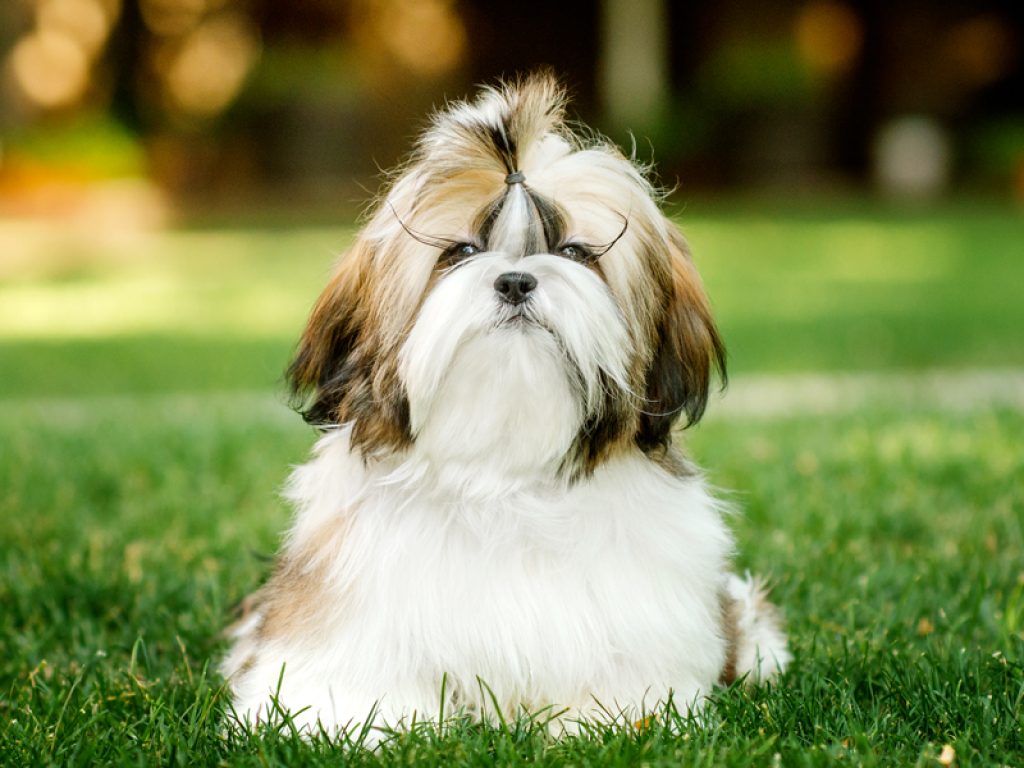
He also fulfils the requirements for a lion dog. The dog, which originates from Tibet, is a wonderful companion and social dog. Yes, he can also become a little stubborn. Basically, however, he is a great, pleasant contemporary, sociable, friendly and good friends with everyone, man and dog alike.
This small dog has a life expectancy of between 11 and 16 years. It grows up to 27 centimetres tall and weighs a full 8 kilograms. The Shih Tzu has a long, dense top coat and a moderate undercoat. Visually, the Shih Tzu appears a little arrogant, which is due to his posture and the distribution of fur on his head. But actually he is not at all. Special features are his ears, which can hardly be seen through his abundance of hair. No, he is not a burr and yet he sometimes asks for attention.
Don’t worry, he is really not a permanent cuddle monster. But he has a lot of energy that has to find an outlet somewhere. For the owner, this means that he has to be prepared for lots of games. Children are enthusiastic partners for him. Once he has had a chance to let off steam, he is a calm contemporary who also likes to just lie on the sofa. Therefore he is also very suitable for senior citizens. He is intelligent and loves to learn. Challenge him by letting him learn new tasks again and again. Although he has little hunting instinct, he can still take the appearance of a prey animal as a call to play.
Although he is usually friendly with everyone, strangers may be completely ignored. Always remember to give him a place to retreat to. Because sometimes he too just wants to be left alone.
The Rhodesian Ridgeback
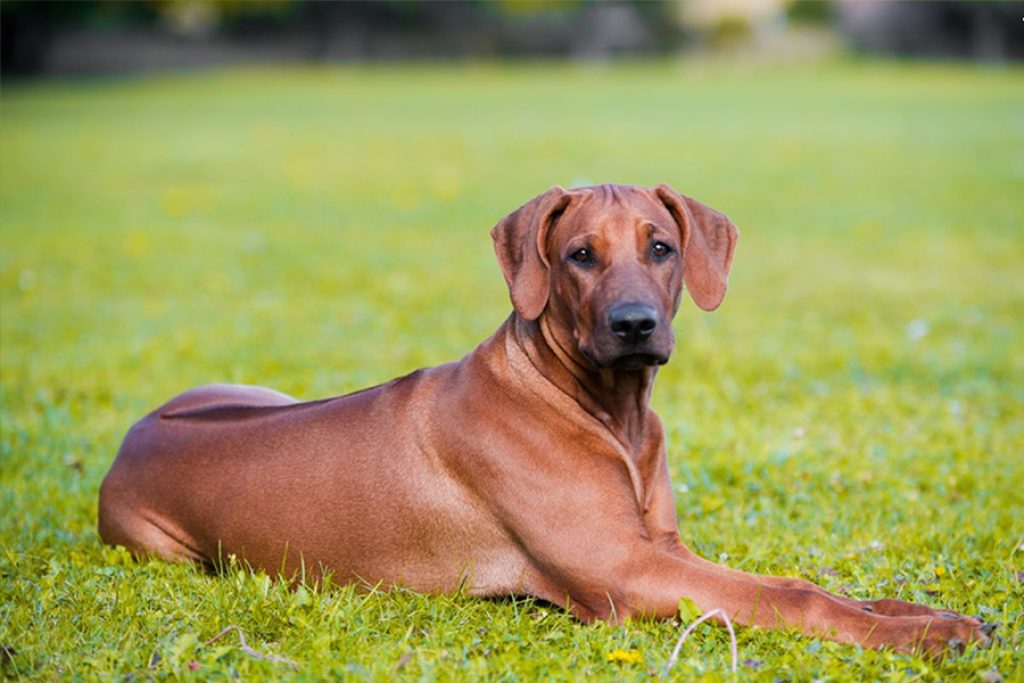
This dog is rightly called “lion dog”, because he is a real big game hunter. That is what he was originally bred for. Today, big game hunting is no longer his main task. Instead, he has turned into a great family dog. Especially children have grown fond of him. He can reach an age of 10 to 12 years.
He can reach a height at the withers of 69 centimetres and a weight of 36 kilograms. He is short-haired and appears in various wheat colours. The short coat is dense and smooth. On the spine, directly behind the shoulders, the characteristic dorsal crest begins. Here the coat shows against the direction of the coat. Without this crest it is not possible! He is a strong bundle of energy and loves to hunt.
He is quite independent, as this was necessary for his hunting practices in the past. Nevertheless, with good basic training he can be handled well by his accomplished owners. He is not a beginner’s dog, which is already demanded by his size and his strength. Due to his independence, a good “dog mind” is necessary. One should always be one step ahead of him mentally.
Certainly, due to his original task, he is a real powerhouse that always needs sufficient exercise and also mental demands. No question about it. But once he has completed his daily “training”, he loves nothing more than to occupy his master’s sofa and take a long nap.
The Rhodesian Ridgeback is not only intelligent, but also very adaptable. This allows him to excel as a hunting dog as well as a companion or guard dog. It is easy for him to learn new tasks and to obediently meet the owner’s demands. One should not call it suspicious. Nevertheless, he will initially be aloof towards any stranger.
He needs his time to get used to all family members and to take everyone in his own way. Here he shows himself extremely sensitive and can be seen as a barometer of his humans’ feelings. He absolutely needs his family connection. Staying alone is no problem, but never exclude this dog from the family.
Do not show him any weaknesses or shortcomings. He registers them immediately and uses them to his advantage. By the way, this dog breed grows up late, at the age of 2 years at the earliest. This means a prolonged basic training and steadiness until he is not only fully grown, but also consolidated on the mental-intellectual level. Show him your respect during the entire training and he will gladly submit to you, even if with rare resistance.
As he would like to follow an interesting trail once in a while, it is necessary to fence the property carefully so that he does not go for walks on his own. Incidentally, if he is to be left alone for too long, he is quite capable of keeping himself busy, much to the annoyance of his owners.
And one last thing: attention should be paid to his food quantity. He does not need as much food as he would like to take in. Experienced dog people will really enjoy the Rhodesian Ridgeback.
FAQ
Are there “real” lion dogs?
Yes, there is a dog breed that rightly bears the epithet “lion dog”, the Rhodesian Ridgeback. It was originally bred for big game hunting in Africa. Big game includes lions, but also other large game animals of the savannah.
Why do other dog breeds get this name – lion dog?
There are two reasons why a dog breed is given the epithet lion dog. 1. the dog’s coat is quite dense and long and seems to show the typical maned lion around the head. 2. these dogs are very independent and have a certain stubbornness about them. They also possess courage, pride and that certain dominance which makes it impossible for even the larger to successfully oppose this dog. In addition, they are known as loners who demand their quiet from time to time. They love to keep an eye on their surroundings.
Which dog breeds belong to the lion dogs?
5 dog breeds are counted as lion dogs: Lhasa Apso, Shih Tzu, Rhodesian Ridgeback, Pekinese as well as the Chow-Chow.
Are any of the 5 lion dogs hunting dogs?
Only the Rhodesian Ridgeback has a hunting potential that could also be used exactly for this purpose. Even if this potential existed in the past and was used accordingly, it is only rudimentary today, so there is no danger that the lion dog would go “on patrol” on its own.
Do lionhounds need special treatment?
No, lion dogs are also normal dogs that need sensible, loving training and good socialisation. It depends on which of the five dogs you want to choose, whether you choose a dog that is easy to train and affectionate towards people, even if it likes to withdraw once in a while. But there are others that are even more independent and stubborn, so they are only suitable for savvy and dog-experienced owners. But apart from that, they are like all dogs: their needs must be met so that they don’t get any stupid ideas.






